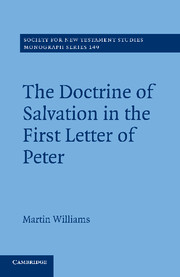Book contents
- Frontmatter
- Contents
- Preface
- Abbreviations
- Introduction
- Part I Methodology
- Part II Literal Sense Exegesis
- 2 Chosen for salvation
- 3 The provision of salvation
- 4 Rebirthed unto salvation
- 5 The expectation of salvation
- 6 Salvation as future victory and vindication
- Part III Intercatholic conversation
- Conclusion
- Bibliography
- Index of names
- Index of References
3 - The provision of salvation
the atonement in 1 Peter
from Part II - Literal Sense Exegesis
Published online by Cambridge University Press: 05 November 2011
- Frontmatter
- Contents
- Preface
- Abbreviations
- Introduction
- Part I Methodology
- Part II Literal Sense Exegesis
- 2 Chosen for salvation
- 3 The provision of salvation
- 4 Rebirthed unto salvation
- 5 The expectation of salvation
- 6 Salvation as future victory and vindication
- Part III Intercatholic conversation
- Conclusion
- Bibliography
- Index of names
- Index of References
Summary
1 Peter 1:18–19: ‘Christ’s suffering as redemptive’
In this chapter we are brought to the heart of the doctrine of salvation as we examine those passages that deal with God’s gracious provision of salvation in Jesus Christ (1 Pet. 1:18–19; 2:21–5; 3:18). As McGrath notes, ‘[f]irst, salvation – however that is subsequently defined – is understood to be linked with the life, death, and resurrection of Jesus Christ’. More specifically, we are preoccupied with the question: How is the death of Jesus actually said to ‘save’? We will see that, for Peter, Jesus’ death saves because it (1) ransoms believers from bondage to a futile, empty, and aimless past (1:18–19), (2) bears the penal consequences which their sins merited (2:21–5), and (3) reconciles believers to God as a substitutionary sacrifice (3:18).
Context
Verses 18–19 are linked to v. 17 by means of the participle εἰδότες (‘knowing’) and the link word ἀναστροϕή. The participle εἰδότες is causal, supplying the reason for the preceding imperative: ἐν ϕόβῳ ἀναστράϕητε (‘conduct yourselves with fear’, v. 17). The verb ἀναστρέϕω (‘act, behave, conduct oneself, live’, v. 17) and its cognate noun ἀναστροϕή (‘way of life, conduct, behaviour’, v. 18), contrast the believer’s ‘way of life’ before and after their conversion: the empty and futile way of life they formerly lived (τς mataiva" ὑμν ἀναστροϕς, v. 18) and the life of reverence toward God in which they now live (ἀναστροϕὴ ἐν ϕόβῳ, v. 17). Verses 17–19, in turn, belong to a larger unit of thought (1:13–21) which consists of a series of aorist imperatives and associated nominal plural participles: ἐλπίσατε with ἀναζωσάμενοι and νήϕοντες (v. 13); γενήθητε with συσχηματιζόμενοι (vv. 14–16); ἀναστράϕητε with εἰδότες (vv. 17–18); ἀγαπήσατε with ἡγνικότες and ἀναγεγεννημένοι (vv. 22–3). The noun ἐλπίδα (v. 21c) and the imperative ἐλπίσατε (v. 13) form an inclusion bracketing the entire unit of vv. 13–21. Here, as elsewhere, Christ’s suffering and death (vv. 18–19) are presented as a motivation for and the basis of Christian behaviour (vv. 13–17; cf. 2:18–20/21–5; 3:13–17/18–22). However, as our passage indicates, Peter does not merely present Christ’s redemptive suffering as a motivation for holy living, but as the very basis for it when he tells his readers that ‘you were ransomed from the futile way of life inherited from your ancestors’ (v. 18b). This chapter focuses on the latter of these two issues.
- Type
- Chapter
- Information
- The Doctrine of Salvation in the First Letter of Peter , pp. 81 - 126Publisher: Cambridge University PressPrint publication year: 2011



